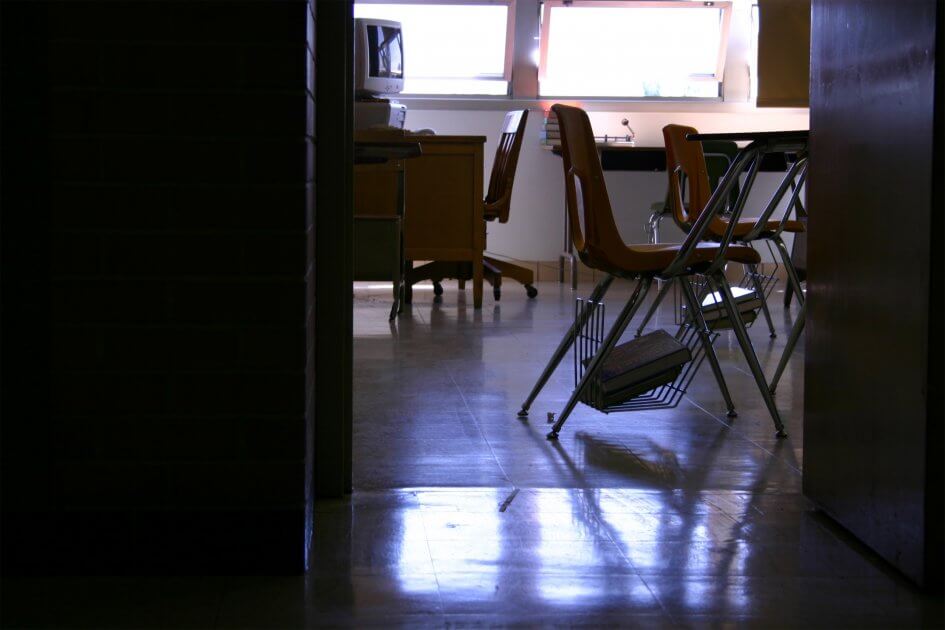Finding the Dog Dead

Lodged in the “Parables” section of David Shields’ and Elizabeth Cooperman’s anthology Life is Short — Art is Shorter, “The School” is cited as “articulating [Donald Barthelme’s] entire vision of the world.” The categorization is justified on the grounds that the piece has a “take-away,” with characters, events, and narratives subordinated to “aboutness,” in this case “textbook existentialism.” I appreciate the framing, but suspect it’s simultaneously too lofty and shallow, both splitting hairs and painting in broad strokes. For me, the thrilling and most effective aspect of “The School” is its runaway momentum. Time lapses to compound increasingly concerning instances of fatality in and around a teacher’s classroom, climbing the parallel ladders of dark comedy and grave danger. The narrator’s conversational account is defensive and pleading, eager to rationalize yet unconvinced of its own explanations. The story is a flurry of fate and fatalism, responsibility and culpability, a reckoning with the insatiable needs of sustained life in its many forms, a prismatic attempt to reconcile individual/collective and local/global concerns.
The narrator backtracks so as to initially conceal the extent to which things are going wrong, and betrays his own inability to reason about the misfortunes implications and possible interconnectedness. “I don’t know why they died, they just died.” His not knowing is interpreted as something he’s afraid will be perceived as a shortcoming for someone who’s assumed the burden of making things make sense to children. He asserts feeling, though, says “it was depressing,” showing that he’s not immune, not personally disaffected. His desperation that things be “explicable” shows the narrator casting his lot with the children in their affliction, confusion, and vulnerability, and yet, given his position of authority, he seeks the silver lining of the teachable moment: the snakes died because the boiler was shut off because of the strike, which is something the children can and do grasp and appreciate.
Searching for somewhere to place blame, he breaks down a couple times and implicates the children: “at least now they know not to overwater,” “well, now they know not to carry [salamanders] around in plastic bags.” This slight hint of enmity (something that seems inevitable if not natural in any imbalance of power) gets flipped when the class rescues a dog and names it after him: “They had a lot of fun running after it and yelling ‘Here, Edgar! Nice Edgar!’ Then they’d laugh like hell. They enjoyed the ambiguity. I enjoyed it myself. I don’t mind being kidded.” It’s possible that this is meant truthfully, but it seems equally plausible that he resents the teasing but knows not to confess it. Further, he’s resigned that the dog is not spared, and that its demise is only deferred. “As soon as I saw the puppy I thought, Oh Christ, I bet it will live for about two weeks and then … And that’s what it did.” The narrator is diligent enough to check the supply closet each day in anticipation of finding the dog dead—which eventually happens—but not enough to make any effort to prevent it from happening.
All of this death builds to a crescendo when the children forsake simple innocence and converse in chorus, “is death that which gives meaning to life? And I said, no, life is that which gives meaning to life. Then they said, but isn’t death, considered as a fundamental datum, the means by which the taken-for-granted mundanity of the everyday must be transcended in the direction of–” The absurdity of this collectively voiced philosophical back-and-forth competes with the unlikelihood of everything that’s precipitated it. Rather than a grand theorem, “The School” serves as a hesitant postulation, a focused telling of a community’s failure to stave off the inevitability of death with sacrificial distractions that only perpetuate a cyclical confrontation of mortality.



